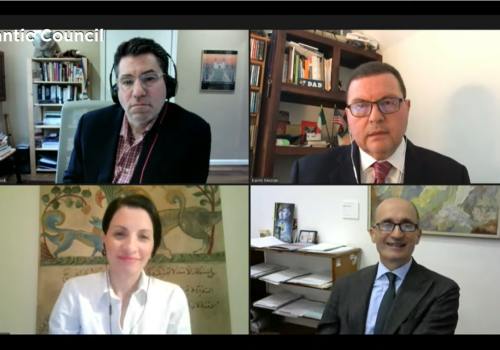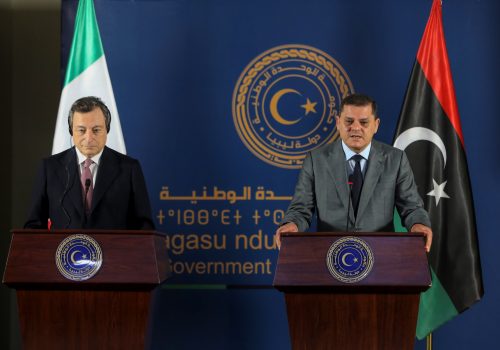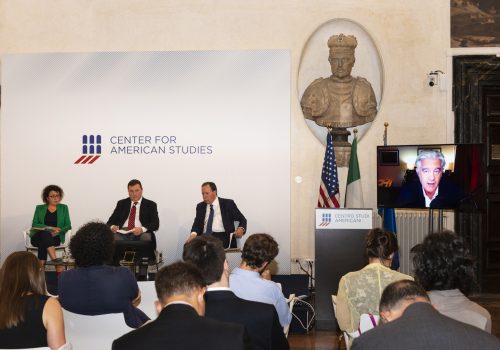Italy recently elected a far-right leader. Here’s how the Arab world reacted to the news.
Over the past ten weeks, the European and American media have paid significant attention to the evolution of the political situation in Italy before the September 25 elections. In particular, this media attention focused on the personal history and views of Giorgia Meloni, leader of Fratelli d’Italia, the party that polls correctly foresaw as the winner of the Italian parliamentary elections. Much of the media attention honed in on doubts regarding her democratic credentials, given that her political origins lie in the Movimento Sociale Italiano (MSI), a political movement considered a direct emanation of the historical National Fascist Party founded by Benito Mussolini in 1921.
These origins were never denied by Meloni, who claims to have moved past this association and has built upon her political career enough to be considered a moderate, democratic conservative politician. Some accuse her of having an excessive nationalistic tone that they fear will translate into anti-European Union (EU) sentiments, such as what was expressed by far-right Hungarian Prime Minister, Viktor Orbán. These arguments have been extensively debated in the international press while much less attention has been given to Meloni’s vision for the Mediterranean Sea vis-à-vis the wider Middle East.
Meloni’s strong calls for controlling illegal immigration are underlined by Islamophobic rhetoric. While stumping, Meloni attributed Italy’s economic and security exacerbations to the surge of asylum seekers in 2015 and 2016. Meloni has called for “no to the violence of Islam, yes to safer borders.” She’s also advocated for setting up a maritime military blockade—in partnership with the EU and Libya—off the shores of North Africa to stop migrants crossing the Mediterranean—a move considered by some of her political opponents as “an act of war.”
The comments expressed by Meloni and other members of her party regarding a new role for Italy in the Mediterranean—i.e. asserting more respect for the sovereign national interests of the country—were tamed and deeply modified during the electoral campaign. As to be expected, the international systemic constraints operating since World War II will effectively limit the new Italian governing coalition’s margins for maneuvering in terms of fiscal, legal, and economic foreign policies. Hence, the fears expressed by political adversaries about the return of fascism and of Italy’s renewed push towards colonialism are simply political propaganda.
The actual policies that will eventually materialize from Meloni’s immigration rhetoric could explain why some North African leaders are cautiously dealing with the rise of Fratelli d’Italia, especially since the governments of Algeria, Libya, Tunisia, and Morocco did not officially address the news. Remarkably, during the same week of Meloni’s victory, Tunisian President Kais Saied’s official account and local Tunisian media outlets announced Saied’s meeting with the Italian ambassador to Tunisia on the occasion of the end of his term, where the two stressed their countries’ keenness to consolidate their “historic friendship ties” further, yet nothing was mentioned regarding the Italian elections.
While official statements were not issued, North African local media took the opportunity to reflect on the implications of Meloni’s win. On the Libyan front, political analysts expressed their concerns about Meloni’s leadership, including by the head of the Libyan Organization for Political Development, Jamal Al-Falah, who views the Fratelli d’Italia as a party that “embraces fascist ideas that had a bad imprint in Libya through killings and executions.” Commenting on Fratelli D’Italia’s foreign policy towards Libya, he stated that their decisions would mostly be shaped by their oil interests in the Mediterranean, especially in light of the current global oil crisis. He went further by claiming that “it is possible that military force will be used in the Libyan file, which is one of Italy’s areas of influence,” since it “sees Libya as a colony of its former colonies, and it may even send Italian battleships to Libya in order to protect its interests.”
It would be very welcome news if a Meloni-led government could really push the timorous Italian political establishment into using its consistent economic and political clout for an effective diplomatic engagement that would tackle some of the thorniest issues in the Mediterranean region. But a high degree of skepticism should remain. The intentions to operate more strongly in Libya, for example, will be limited by Italy’s traditional lack of willingness to support its decisions to eventually adopt the military instrument. This also goes beyond the scarce possibility of the government and parliament being capable of drafting a clear definition of Italy’s positions and interests in the highly-fragmented and volatile situation in the North African country.
Furthermore, Italy’s position in the EU and the difficult balance of power within the latter will determine its position regarding the eastern Mediterranean area, irrespective of Meloni’s wishes and wills, especially regarding Turkey’s regional activism. In other words, it could be more accurate to see a continuation of Italy’s current foreign policies, rather than a traumatic change in the near future.
In Morocco, prominent e-newsletter Morocco World News reported that Italy’s “political shift could be worrying for the nearly half a million Moroccans who live in Italy,” as Meloni could bring Italy closer “to its most far-right national politics since the fascist regime of Benito Mussolini.” Aside from its xenophobic fears, Morocco holds other security concerns that could explain its precautionary reaction toward Meloni’s win. A member of Italy’s Italian Parliamentary Committee for Solidarity with the Sahrawi People, the right-wing leader has repeatedly voiced her support of an autonomous Western Sahara—now controlled by Morocco—and expressed her sympathy towards Saharan refugees, whom she’s visited twice in camps. Whereas an escalation of Meloni’s political actions towards Western Sahara’s independence would certainly strain Italy’s bilateral ties with Morocco, Algerian media has reported that Meloni’s backing of the Sahrawi people would be an added asset to the “deep strategic relations between Algeria and Italy.”
The Maghreb countries’ reception of the new Italian government has, thus, been carried out with careful precaution so as not to stir domestic discontent, but also to prevent any premature judgment of the implications that may arise from the Brothers of Italy’s policies towards the region. Those in the region don’t want to appear too welcoming or too critical—just yet. Therefore, from a general overview of the first reactions of the Arab media, it is possible to determine that, after pondering the same questions regarding neo-colonialism and neo-fascism, Maghreb countries have reached the same conclusions as we have delineated above: not much will change in the strategy of Italian foreign policy towards the region.
The results of the election were welcomed more positively on the eastern side of the Mediterranean. Upon congratulating Meloni, Egyptian President Abdel Fattah El-Sisi said he was looking forward “to working with her within the framework of the well-established partnership that Egypt and Italy share to further enhance bilateral ties across all fields.” While among the Gulf countries, Meloni thanked the United Arab Emirates’ President Sheikh Mohammed bin Zayed Al Nahyan and Vice President and Ruler of Dubai, Sheikh Mohammed bin Rashid Al Maktoum, for their congratulatory messages and expressed her eagerness to “work together for fruitful bilateral cooperation and the stability of the Middle-East.”
Similarly, congratulatory wishes were also addressed by Bahrain’s Crown Prince and Prime Minister, Salman bin Hamad Al Khalifa. While anticipated economic and investment deals certainly play a role in advancing these strategic partnerships, perhaps a common sense of nationalism, albeit different at its core, also binds these countries together from an ideological perspective.
Nevertheless, Italy’s ties with the Gulf countries could start crossing a delicate tightrope if the Fratelli d’Italia government proceeds with a political strategy that effectively marginalizes Arabs and Muslims domestically.
Moving forward, Meloni’s government should carefully consider how it handles its nationalistic discourse to avoid any Islamophobic controversies that could ultimately spark a blowback of condemnations from its allies in the Arab world.
Karim Mezran is director of the North Africa Initiative and resident senior fellow with the Rafik Hariri Center and Middle East Programs at the Atlantic Council.
Nour Dabboussi is a researcher on the Middle East and a recent graduate of Columbia University and Sciences Po.
Further reading
Fri, Mar 11, 2022
North Africa’s transatlantic relations: How the US can engage its European allies in North Africa
MENASource By
As Russia’s invasion of Ukraine continues, US and European partnership and collaboration in North Africa becomes imperative to protecting shared values across the region.
Fri, Apr 16, 2021
Italy found its way back into Libya
MENASource By Karim Mezran, Alissa Pavia
Italian Prime Minister Mario Draghi’s visit to Libya is a big step for renewing Italy’s role in Libya and the wider Mediterranean, one that should not be overlooked.
Thu, Jun 16, 2022
A new transatlantic relationship for the Middle East and North Africa
Event Recap By
On June 7, the Atlantic Council’s (AC) North Africa Initiative hosted an event, “New Transatlantic Relations for the Middle East and North Africa,” in collaboration with US Embassy Rome and Centro Studi Americani. Moderated by Karim Mezran, director of the AC’s North Africa Initiative and resident senior fellow at the Atlantic Council, the event explored […]
Image: Leader of Brothers of Italy Giorgia Meloni attends meeting with Brothers of Italy newly elected MPs in Rome, Italy, October 10, 2022. REUTERS/Guglielmo Mangiapane


